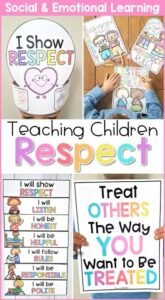The Importance of Respect

Respect is a fundamental pillar that governs successful interpersonal relationships and cohesive societies. It entails acknowledging the inherent worth of individuals, valuing their opinions, and appreciating their rights, regardless of differences. In teaching respect, parents are equipping children with critical tools that enable them to navigate the complexities of human interactions effectively. This foundation is crucial for fostering healthy communication, which forms the bedrock of any thriving relationship.
By understanding and practicing respect, children learn to express themselves appropriately, listen to others actively, and engage in constructive dialogues. Such skills foster an environment where differing views can coexist harmoniously, significantly reducing the potential for conflict. As children learn to approach disagreements respectfully, they are better prepared to handle conflicts without resorting to hostility or aggression, ultimately leading to more peaceful resolutions.
Moreover, respect contributes significantly to a child’s emotional development. It enhances their self-esteem and promotes a sense of belonging, which is essential for mental health. When children recognize that they are worthy of respect, they develop healthier self-images and are less susceptible to feelings of inadequacy. This internal validation also encourages them to extend the same respect to others, creating a cycle of positive interactions that enrich their social experiences.
In a broader context, the social fabric of communities is strengthened when individuals practice respect. Societies characterized by mutual respect are more likely to cooperate towards common goals, support diversity, and uphold social justice. Therefore, instilling the value of respect in children is imperative not only for their individual growth but also for the collective well-being of society. Teaching respect prepares children to become empathetic and responsible citizens, equipped to contribute positively to their communities.
The Mother’s Role in Teaching Respect

Respect is a fundamental value that shapes a child’s character and behavior. As primary caregivers and educators within the family, mothers hold a significant influence over their children’s understanding of respect. From early childhood, mothers can model behaviors that exemplify respectful interactions, thereby setting a foundation that children are likely to emulate throughout their lives.
One of the key strategies for instilling respect is through open communication. Mothers can encourage children to express their thoughts and feelings freely, while also teaching them to listen to and validate the perspectives of others. Engaging in such dialogues fosters an environment where respect for differing opinions becomes second nature. Moreover, by addressing conflicts in a respectful manner and demonstrating effective conflict-resolution techniques, mothers can provide children with vital tools for handling disagreements with dignity.
Beyond communication, mothers should strive to embody respectful behavior in their own actions. Children are keen observers, often learning more from what they see than what they hear. Therefore, showing respect towards family members, friends, and even strangers sets a powerful example. Simple acts such as saying “please” and “thank you,” practicing active listening, and demonstrating empathy are all pivotal in teaching respect. When children witness their mothers displaying these behaviors consistently, they are naturally inclined to adopt similar practices.
Additionally, it is important for mothers to establish clear expectations regarding respectful conduct. This can be done by setting guidelines for behavior and discussing the consequences of disrespectful actions. Reinforcing the concept that respect is a two-way street leads children to understand its reciprocal nature, encouraging them to extend the same courtesy to others as they wish to receive themselves. By applying these strategies, mothers play an essential role in nurturing respect as a core value in their children’s lives, guiding them toward becoming empathetic and respectful adults.
Respecting Women: A Fundamental Lesson for Sons

Teaching respect for women is a vital responsibility for mothers, as it plays a crucial role in shaping boys into respectful individuals, partners, and colleagues. Respectful behavior towards women is characterized by treating them as equals, valuing their opinions, and acknowledging their autonomy. To cultivate these traits, mothers can begin instilling this vital lesson from an early age by modeling respectful behavior in their own interactions with women, whether family members, friends, or even strangers. This approach not only reinforces positive behavior but also demonstrates the importance of mutual respect in all relationships.
It is paramount for mothers to convey the message that all individuals, regardless of gender, deserve respect and dignity. By engaging in open dialogues about gender equality, they can help their sons understand the harmful effects of sexism and discrimination. Encouraging critical thinking allows boys to question stereotypes and societal expectations, laying the foundation for healthier relationships with women throughout their lives. This approach fosters empathy and awareness, which are essential components of respectful interactions.
Moreover, mothers can take practical steps to teach respectful behavior. This includes discussing scenarios wherein respect is compromised and modeling appropriate responses. Reinforcing the idea that consent is non-negotiable in every relationship instills a sense of accountability in their sons. In addition, mothers should encourage their children to celebrate women’s achievements and contributions to society, reinforcing the idea that respect is rooted in equality and acknowledgement.
As sons observe and learn from their mothers, they are likely to embody these principles in their future behavior. A strong emphasis on respect for women not only enriches boys’ understanding of relationships but also enhances their personal growth into empathetic and responsible adults. Instilling these values will ultimately result in a generation that values equality and mutual respect in all interactions.
Teaching Respect for In-laws
Instilling respect for in-laws in children, particularly sons, is a vital aspect of nurturing positive familial relationships. It is essential for mothers to convey the significance of honoring and acknowledging the contributions and presence of extended family members. This respect can lay a solid foundation for family unity and harmony, especially during significant events such as weddings, holidays, or family gatherings, where interactions with in-laws become more frequent.
One effective approach to teaching children about respect towards in-laws is by modeling appropriate behaviors. Children learn by observing their parents, and when they witness acts of kindness, consideration, and politeness directed towards their grandparents or other extended family members, they are more likely to imitate those behaviors. Simple acts such as greeting relatives warmly, showing gratitude, or helping them with everyday tasks can illustrate the importance of respect in action.
Understanding familial roles and traditions is another crucial facet in this learning process. It is helpful for children to be educated about the cultural and historical significance of their in-laws’ customs, allowing them to appreciate and value their backgrounds. This understanding fosters a sense of connection and belonging, which naturally promotes respect. Additionally, discussing common scenarios where respect can be demonstrated—such as listening attentively during conversations or politely addressing in-laws—encourages children to practice respectful interactions in real-life situations.
Engaging in open dialogue can also help children articulate their feelings towards their in-laws. Encouraging them to express their thoughts, questions, or concerns regarding these relationships can clarify their understanding and encourage them to see the value in having respectful ties with family members. Overall, these strategies are essential for teaching respect for in-laws, ensuring that children grow into respectful adults who maintain healthy family relationships.
Cultivating Respect Through Communication
Effective communication serves as a foundation for teaching respect within the family unit. When children observe their parents engaging in meaningful dialogues, they learn the importance of mutual understanding and appreciation for others. One essential technique in fostering respectful interactions is active listening. This involves fully concentrating on what the speaker is saying, acknowledging their feelings, and responding thoughtfully. Parents can model active listening by maintaining eye contact, avoiding interruptions, and showing empathy. As children mimic these behaviors, they develop the ability to listen and respect the opinions of others.
Another key element in promoting respect is cultivating a habit of expressing gratitude. By regularly acknowledging and appreciating the efforts of family members, children learn to value kindness and the contributions of others. Parents can set an example by verbally expressing gratitude for simple acts, such as preparing a meal or completing a chore. When appreciation is communicated effectively, it reinforces positive behaviors and instills a sense of respect for one another’s roles within the household.
Furthermore, providing constructive feedback plays a critical role in teaching respect. Parents should focus on being specific about the behavior that requires change, rather than criticizing the individual. This approach not only preserves the child’s self-esteem but also reinforces the idea that everyone makes mistakes, allowing them to express themselves respectfully during disagreements and discussions. When parents illustrate how to address issues while maintaining respect, they equip their children with essential life skills.
In summary, cultivating respect through communication is paramount in nurturing respectful individuals. By modeling active listening, expressing gratitude, and offering constructive feedback, parents create an environment that values respect and understanding. This groundwork builds strong family dynamics and lays the foundation for children to exhibit respect in their interactions with others.
Addressing Disrespect: Responding to Disrespectful Behavior
Addressing instances of disrespect in children is a crucial aspect of a mother’s role in teaching values. Disrespectful behavior can manifest in various forms, such as talking back, disregarding instructions, or displaying rudeness toward peers and adults. It is essential for mothers to approach these behaviors with a balanced perspective, recognizing that children often test boundaries as part of their development.
One of the most effective strategies for addressing disrespect is to set clear boundaries. Establishing rules around acceptable behavior helps children understand the expectations set for them. Consistency is key; mothers should enforce these boundaries gently yet firmly. For example, if a child speaks rudely, a mother can calmly remind them of the importance of respectful communication and outline the specific behavior that is unacceptable.
Modeling respectful responses also plays a vital role in teaching children the value of respect. Children learn by observing their parents, and seeing a mother demonstrate respectful behavior—even in the face of frustration—reinforces the idea that responding respectfully is a viable option. For instance, during disagreements, using phrases like “I understand how you feel” can teach children to communicate their feelings without resorting to disrespect.
Mothers can also create teachable moments out of conflicts. When disrespectful behavior arises, it can be an opportunity to discuss the consequences of such actions. Engaging in open conversations about feelings, the impact of words, and the importance of kindness can help children grasp the broader implications of their behavior. This approach not only addresses the immediate issue but encourages self-reflection and growth.

Ultimately, by setting clear boundaries, modeling appropriate behavior, and using conflicts as learning moments, mothers can effectively guide their children towards developing a respectful demeanor. This not only enhances the mother-child relationship but also instills lasting values that children carry into their interactions with others.
The Ripple Effect of Teaching Respect
Teaching respect is a fundamental responsibility of parents, particularly mothers, who play a crucial role in shaping the values and behaviors of their children. The implications of instilling respect extend far beyond the family unit, influencing interactions within schools, communities, and society at large. When children learn to respect their parents, peers, and authority figures, they are equipped with the tools necessary to foster positive relationships and contribute to a harmonious environment.
In school settings, children who understand the importance of respect often display enhanced social skills, demonstrating kindness and empathy towards classmates. This nurturing approach not only facilitates better learning experiences but also diminishes instances of bullying and conflict. By modeling respectful behavior, mothers can help children develop a strong moral compass, guiding them to navigate complex social dynamics with integrity and compassion.
Furthermore, the lessons taught at home regarding respect can ripple out to the community. Children who internalize these values are more likely to engage in community service, advocate for others, and address social issues with a caring mindset. This collective respect cultivates an atmosphere where dialogue and understanding thrive, paving the way for collaborative problem-solving. In environments characterized by mutual respect, community conflicts are minimized, fostering a sense of belonging and shared purpose among residents.
Moreover, these children become agents of change, setting an example for their peers and generations to come. As they transition into adulthood, their ingrained respect for others translates into professional environments and sociopolitical situations, aiding in the establishment of inclusive and equitable practices. The broader societal implications of teaching respect highlight its vital role in nurturing responsible, empathetic citizens who contribute to a more respectful society.
Encouraging Mutual Respect in Relationships

Mutual respect is a cornerstone of any successful romantic relationship, and it serves as a pivotal value that children learn by observing their parents. When children witness positive interactions characterized by equality, admiration, and kindness, they are more likely to internalize these values and apply them in their own relationships as they mature. To foster an environment where mutual respect thrives, parents must consciously model healthy interactions.
One of the key aspects of a respectful partnership is the ability to communicate openly and honestly. Parents should strive to engage in meaningful conversations with one another, demonstrating effective listening skills and validation of each other’s feelings. This practice not only reinforces the importance of communication but also highlights its role in sustaining respect within a relationship. Children observing such interactions are likely to understand the significance of dialogue and empathy, which are essential components in their future relationships.
Another critical component of respect in romantic partnerships is equality. Both partners should take on shared responsibilities, whether in household tasks or emotional support. By showcasing a balanced dynamic, parents send a clear message about the importance of collaboration and mutual appreciation. Children are perceptive, and they naturally pick up on disparities in treatment or power dynamics, potentially leading them to model unhealthy behaviors in their own lives.
Moreover, celebrating each other’s achievements and expressing gratitude can significantly boost the level of respect in a relationship. Parents who recognize and honor each other’s contributions not only enrich their bond but also impart valuable lessons to their children about the merits of admiration and acknowledgment.
Ultimately, the cultivation of mutual respect in romantic relationships serves as a pivotal learning experience for children. By embodying these values, parents equip their children with the tools necessary to form healthy and respectful connections throughout their lives.
Practical Activities to Teach Respect

Fostering respect in children is a multifaceted endeavor that requires parents to engage in diverse activities with their kids. One effective method is role-playing various scenarios that children may encounter in daily life. By simulating situations, such as a disagreement with a friend or a discussion with a teacher, parents can illustrate the importance of respectful communication. This exercise encourages children to express their feelings while also considering the perspectives of others, ultimately nurturing their empathetic abilities.
Family discussions serve as another critical avenue for instilling respect. Setting aside time each week for open dialogues about topics such as differences in culture, religion, and viewpoints can significantly broaden a child’s understanding and appreciation for diversity. During these discussions, parents can prompt their children to share their thoughts and challenge biases in a supportive environment. This practice not only instills respect but also equips children with essential skills for navigating real-world interactions.
Participation in community service initiatives is a powerful way to teach respect for others and the value of giving back. By engaging in volunteer activities, families can expose children to diverse communities and issues that are often overlooked. Whether it is helping at a local food bank or organizing a neighborhood clean-up, these experiences allow children to see firsthand the importance of compassion and respect for different socio-economic backgrounds. Such activities enrich their understanding of the world and embed a deep-seated respect for all individuals.
Incorporating these practical activities into daily routines can make a significant impact on children’s perception of respect. By creating an environment that values understanding and appreciation, parents are uniquely positioned to cultivate a sense of respect within their children that lasts a lifetime.


